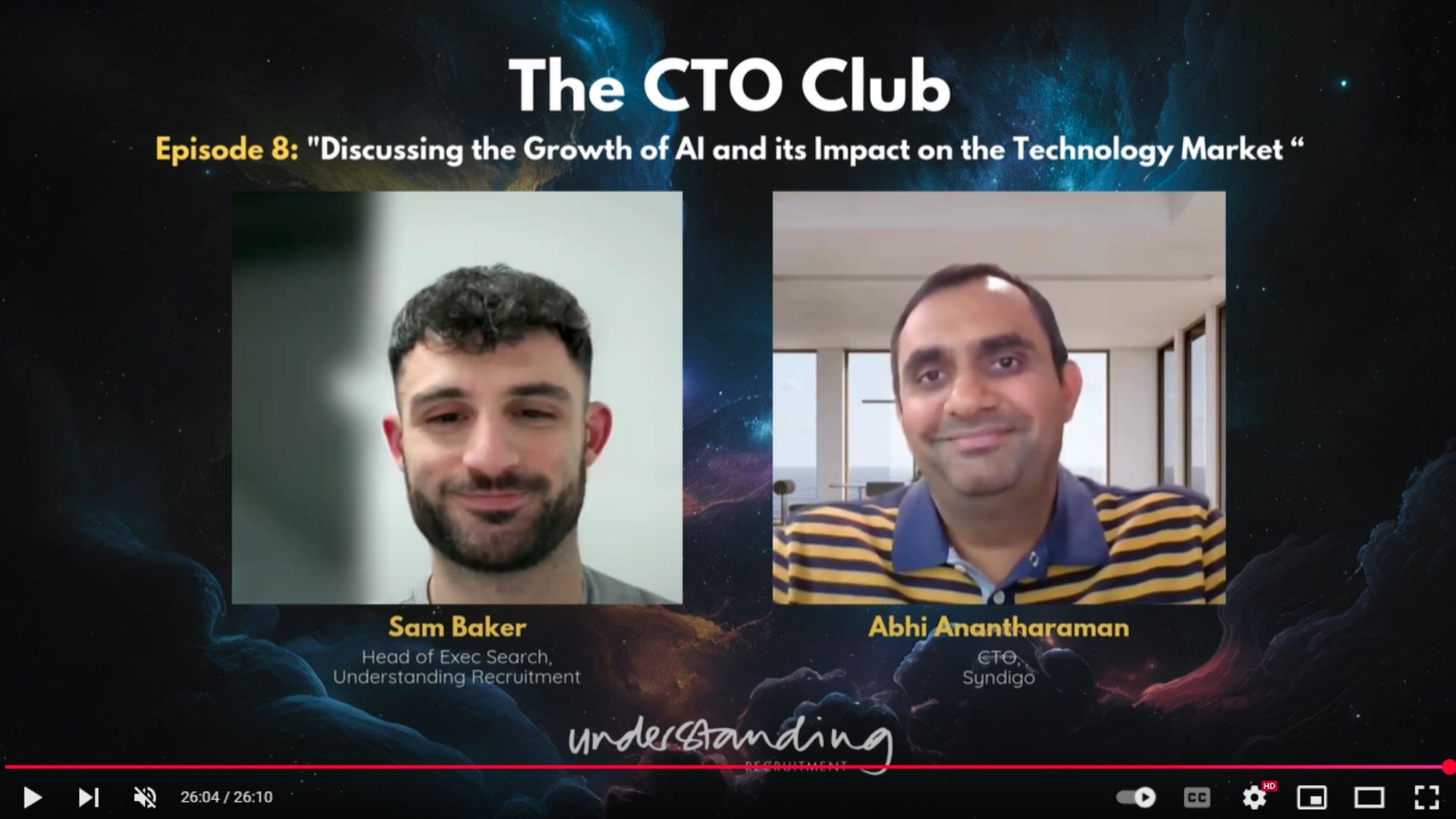
Top 5 Emerging Tech Jobs in Crypto and Blockchain
21st May, 2024 14 min
As the adoption of cryptocurrencies and blockchain technology continues to expand, so too does the demand for professionals with the skills to help companies navigate this ever-evolving field. From cyber security specialists to data analysts, the crypto and blockchain space is booming with fulfilling and lucrative tech jobs for people with the right skills and expertise.
If you are a tech professional looking to ply your trade in a cutting-edge sector, entering the crypto and blockchain industry may be the right path for you. This begs a key question - what are the most cutting-edge jobs that I can pursue in this fascinating area of tech recruitment?
In this guide, we will explore 5 of the most interesting and trailblazing roles crypto and blockchain professionals should consider in 2024. We’ll go beyond traditional developer roles and examine a selection of new opportunities, including:
Blockchain Security Architect
DeFi Blockchain Developer
Crypto Product Manager
Crypto Security Engineer
Data Analyst
1. Blockchain Security Architect
First up on our list of crypto and blockchain tech jobs is blockchain security engineer.
With an increasing number of companies choosing to adopt blockchain technology, it is certain that the demand for cyber security professionals with blockchain expertise will intensify. Responsible for ensuring secure and reliable systems, blockchain security architects are at the forefront of minimising cyber threats that can impact blockchain technology.
Skills and Responsibilities of a Blockchain Security Architect
The role of blockchain security architect is highly specialised. Rather than having a general grasp of cyber security principles, this position requires a high level of expertise in both blockchain technology and reducing the risk of cyber threats. From conducting risk assessments of blockchain systems to implementing cyber security measures, blockchain security architects must perform a wide array of duties.
Blockchain security architect job responsibilities include:
Design and develop blockchain architectures using cryptographic algorithms and network configurations to guarantee security and scalability
Implement cyber security policies to ensure developers follow secure coding practices, data encryption, and access control within blockchain systems
Regularly conduct security evaluations of blockchain technology to identify potential vulnerabilities and and flaws
Carry out code reviews and audits to ensure compliance with security standards and pinpoint programming errors
Actively monitor and respond to cyber security incidents impacting blockchain networks and systems
If you wish to enter the blockchain security architect profession, an in-depth understanding of blockchain fundamentals is essential. Having a solid grasp of concepts like distributed ledgers, consensus mechanisms, and cryptography will enable you to build the kind of secure blockchain networks companies require. Other relevant technical skills include expertise in programming languages used for blockchain development, experience in conducting security audits, and familiarity with blockchain platforms like Fabric and Corda.
In addition to the requisite blockchain and cyber security expertise, employers will look out for a selection of soft skills. These may include exceptional analytical and problem-solving skills, effective written and verbal communication, and an interest in keeping up to date with industry trends and developments.
How to Become a Blockchain Security Architect
Becoming a blockchain security architect requires a combination of academic qualifications, hands-on experience, and passion for blockchain technology. Like with many tech jobs, having a degree in a computer science-related subject is a minimum requirement. Getting to grips with computer programming, network security, and cryptography will prepare you for a career in blockchain. After obtaining your degree, pursuing qualifications related to blockchain technology will help to show employers that you are well versed in the relevant areas.
As well as gaining academic and professional qualifications, you should focus on gaining hands-on experience to enhance your blockchain security knowledge. There are various ways to pick up practical experience with blockchain technology, including contributing to open-source blockchain projects, taking part in hackathons, and volunteering to work with blockchain professionals. By following these steps, you’ll be well-equipped to apply for blockchain security architect jobs.

2. DeFi Blockchain Developer
With the global Web3 market size set to reach $5.5 billion by 2030, the demand for tech professionals with blockchain development expertise is likely to rise dramatically. An in-depth understanding of blockchain technology is necessary for Web3 infrastructure, so it is unsurprising that firms looking to adopt this innovative technology are on the lookout for crypto and blockchain specialists who can ensure successful implementations.
Another trend that has emerged in the wake of the Web3 revolution is the increased usage of decentralised finance (DeFi) applications. Given this move toward decentralised digital finance solutions, the role of DeFi blockchain developer has become one of the industry’s most in-demand professions.
Skills and Responsibilities of a DeFi Blockchain Developer
An integral component of the Web3 infrastructure space, decentralised finance aims to replicate traditional aspects of finance like loans, asset management, and exchanges without any involvement from third-party intermediaries. DeFi blockchain developers are tasked with designing and managing DeFi applications, thereby facilitating high-quality user experiences.
DeFi blockchain developer job responsibilities include:
Design and outline smart contracts that power DeFi applications using relevant coding languages like Solidity
Identify and remove bugs and security vulnerabilities before deployment smart contracts on the blockchain
Build user-friendly interfaces that allow users to seamlessly access DeFi services including crypto asset trading, lending, and borrowing
Work alongside developers, designers, and product managers to deliver DeFi solutions
Carry out regular security audits to detect and address potential security vulnerabilities in DeFi software
DeFi blockchain developers must possess a combination of technical and soft skills to perform their duties effectively. Similar to the previous role we discussed, this position requires a thorough knowledge of blockchain development fundamentals, including consensus mechanisms and distributed ledger technology. Deep knowledge of DeFi applications, smart contract development, cyber security, and programming languages are also essential.
DeFi developers are often required to come up with innovative solutions to complex issues, so problem-solving and analytical skills are qualities that employers will pay close attention to. Effective communication, collaboration, and the learning abilities to stay up to date with the latest advancements and best practices are the most important soft skills DeFi blockchain developers must have.
How to Become a DeFi Blockchain Developer
So, are you interested in becoming a DeFi blockchain developer? Before jumping into your job search, you must follow a series of steps to ensure that you possess the required qualifications and experience that employers look for. As well as securing a computer science-related degree, candidates should gain a deep understanding of blockchain technology decentralised finance. You should also invest time and effort into learning relevant programming languages and blockchain development tools such as Truffle, Hardhat, and OpenZeppelin.
Although academic and professional qualifications are key for demonstrating expertise and commitment to the profession, employers typically consider hands-on experience to be equally important. Building your own smart contracts is a great way to showcase your blockchain developer skills and decentralised finance knowledge. You could also develop dApps and contribute to open-source projects, activities that will show you are able to apply your theoretical knowledge to real-world situations.
With financial services becoming ever-more digitised, it’s no secret that AI and machine learning are having a profound impact on the world of financial technology. If you are interested in learning more about how automation is reshaping the FinTech space, we urge you to read our Understanding the Future of Artificial Intelligence in Finance guide.
3. Crypto Product Manager
Next up on our list of emerging tech jobs in crypto and blockchain is an especially cutting-edge role - crypto product manager. Business is booming in the cryptocurrency space right now, with research from LinkedIn indicating that crypto job listings rose by a staggering 395% last year. There is every indication that the positive job outlook for cryptocurrency professionals is here to stay, and crypto product managers find themselves at the forefront of this trend.
Skills and Responsibilities of a Crypto Product Manager
Combining knowledge of traditional product management methods with cryptocurrency and blockchain expertise, crypto product managers are instrumental in delivering and enhancing crypto services and products. Bridging the gap between state-of-the-art cryptocurrency technology and usability, these vital professionals are responsible for delivering crypto products that are user-friendly, innovative, and secure.
Crypto product manager job responsibilities:
Outline the company’s cryptocurrency product strategy and vision
Ensure that crypto products and intuitive and user friendly
Collaborate with engineering teams to translate product design into actionable features that prioritise user needs
Make data-driven decisions about product development, marketing, and pricing strategies
Keep up to date with the latest trends and developments in the cryptocurrency space
To succeed as a crypto product manager, it is essential that you have a firm grasp of blockchain and cryptocurrency fundamentals. With deep knowledge of intricate concepts like distributed ledger systems, smart contracts, and the differences between cryptocurrencies, you’ll be able to ensure that your firm’s products are as innovative as possible.
As well as possessing technical abilities, crypto product managers must be business-savvy. From the ability to conduct market analysis to an understanding of market research and product roadmaps, these professionals typically apply their business knowledge to ensure product releases are seamless and profitable. Other desirable skills crypto product manager candidates should be able to demonstrate include problem-solving, leadership, and regulatory awareness.
How to Become a Crypto Product Manager
If you are looking for a rewarding position that blends high-tech concepts and management abilities, a career in crypto product management may just be the right path for you. So, what are the steps you need to take to enter this innovative profession? As with the other tech jobs we have explored on this list, the first barrier to entry is a strong understanding of blockchain and crypto fundamentals.
To demonstrate your expertise, you should hold a degree in a computer science-related discipline, along with evidence of having studied blockchain and cryptocurrencies. To expand your business acumen, you may want to take relevant courses that prepare you for product management positions. Once you have successfully honed your crypto and business skills, you should seek to engage with and join networks of crypto professionals on platforms such as LinkedIn.
Gaining work experience within the crypto industry is also vital. Prior to applying for crypto product management jobs, you could work in a blockchain startup or contribute to open-source, freelance blockchain projects, experiences that you can add to your portfolio.

4. Crypto Security Engineer
Given the growing emphasis on the importance of cyber security in blockchain and crypto technology, it is unsurprising that the role of crypto security engineer has become ever-more prominent in recent years. Specialising in safeguarding cryptocurrency systems from malicious cyber attacks, cyber security engineers have similar duties to that of a blockchain security architect, but with some subtle differences as we will delve into over the following sections.
Skills and Responsibilities of a Crypto Security Engineer
Cryptocurrency experts with a deep understanding of cyber security measures will likely be intrigued by the position of crypto security engineer. They work closely with crypto development teams and stakeholders to identify and minimise risks posed by cyber threats. Cryptocurrency transactions and infrastructure are highly vulnerable to security breaches, but by following the right procedures, crypto security engineers can effectively repel hackers.
Crypto security engineer job responsibilities include:
Design and implement security measures for crypto technology, including wallets, exchanges, and blockchain networks
Establish cyber security protocols and best practices to ensure secure handling of crypto transactions and exchange
Conduct regular penetration testing to identify and address vulnerabilities in cryptocurrency networks
Develop incident response plans for managing security incidents and breaches
Provide security training to educate employees about the dangers of cyber threats and how to reduce risks
To perform your duties as a Crypto Security Engineer, you should possess a variety of must-have skills in addition to a comprehensive understanding of cryptocurrency principles and blockchain technology. These include proficiency with cryptographic algorithms, knowledge of coding languages like Python and Solidity, and expertise in security tools and frameworks such as cryptography libraries and vulnerability scanners.
Although an abundance of technical expertise is certainly necessary, so too are soft skills, particularly written and verbal communication. A key part of the job is to explain potentially complex or intricate concepts to colleagues without technical backgrounds, not least when conducting training sessions. In addition to strong communication, other relevant non-technical skills include an eye for detail, exceptional problem-solving abilities, and collaboration.
How to Become a Crypto Security Engineer
The first step in becoming a crypto security engineer is to gain academic qualifications that demonstrate your foundational knowledge in computer science and cyber security. Once you have attained a degree in a computer science-related subject, you can broaden your knowledge by pursuing professional courses that cover areas such as cryptography, network security, and computer algorithms. During this time, you should consolidate your knowledge of crypto and blockchain technology.
As well as gaining certifications that prove your dedication to the profession, you should focus on building a portfolio that showcases your skills. You should include pieces of work that display your crypto security engineering expertise, such as contributions to research papers, personal projects, and examples of designing and implementing secure cryptographic systems.
5. Data Analyst
The demand for data analysts is intensifying. According to the U.S. Bureau of Labor Statistics, data analytics jobs are projected to grow by 23% by 2031. Widely sought-after by a range of industries, data analysts are especially needed in the crypto and blockchain space. They utilise data-driven insights to support firms with market analysis, risk management, and cryptocurrency research.
Skills and Responsibilities of a Data Analyst
Data analysts play a fundamental role in the crypto and blockchain industry. With an in-depth understanding of the crypto market and the data analysis tools used to extract important insights, data analysts in this field leverage their expertise to bridge the gap between the technical world of cryptocurrencies and blockchain and strategic, data-led decision making.
Data analyst job responsibilities include:
Collect and clean data taken from relevant sources, such as blockchain networks and cryptocurrency transactions
Utilise data analytics tools like SQL and blockchain explorers to manipulate data
Identify key patterns and user behaviour in the cryptocurrencies market
Translate intricate data into clear, digestible reports that stakeholders and investors can understand
Keep up to date with the latest blockchain trends and developments to pinpoint market opportunities
The blockchain and cryptocurrency space requires data analysts who possess a selection of in-demand skills. With a combination of technical abilities and analytical flair, you are likely to impress employers seeking data analysts to enhance their blockchain technology efforts. Relevant technical skills for the role include proficiency in programming languages, utilising tools for data management, and quantitative analysis skills.
Having a variety of soft skills will also help you perform your data analysis duties. A talent for problem-solving is bound to aid you in managing and overcoming unforeseen issues with crypto transactions, while excellent communication will help you to explain intricate data concepts to colleagues who are not familiar with data analysis.
How to Become a Data Analyst
The path to becoming a data analyst starts with earning a bachelor’s degree in a relevant field, such as data science, mathematics, or statistics. Upon completing this qualification, you should have a firm grasp of data analysis concepts. The next step is to expand your knowledge of cryptocurrencies and blockchain, learning about the programming languages and libraries used in blockchain technology. Taking online courses and bootcamps in data analysis and blockchain will also prepare you for this career path.
Building a comprehensive portfolio brimming with examples of your data analysis work is a sure-fire way to impress potential employers. Be sure to include any personal projects you have been working on, particularly those relating to analysing DeFi protocols or cryptocurrency transaction data. Networking with other like-minded professionals can help you to connect with businesses who may be looking for data analyst specialists, so make sure to attend blockchain meetups and engage with people on LinkedIn.

Key Takeaways From 5 Emerging Tech Jobs in Crypto and Blockchain
The world of cryptocurrency and blockchain technology offers a variety of exciting and rewarding career opportunities for tech professionals. From safeguarding blockchain networks as a security architect to revolutionising decentralised finance as a DeFi blockchain developer, the possibilities are vast and ever-expanding.
As outlined in this guide, each role demands a unique blend of technical expertise, problem-solving prowess, and a deep understanding of blockchain fundamentals. Moreover, the rapid growth and evolution of the crypto industry necessitate a commitment to continuous learning and staying up to date of emerging trends.
Whether you're drawn to the intricacies of blockchain security, the innovation of DeFi, or the strategic vision of product management, pursuing a career in this dynamic field promises both personal fulfilment and professional growth.
Leading the Way in Crypto and Blockchain Recruitment
With years of experience in the crypto and blockchain recruitment space, the Understanding Recruitment team are passionate about helping candidates land their dream positions within this thriving, dynamic field. With a vast client network that includes businesses throughout the UK, Europe, and the USA, our consultants are equipped to support you in securing roles that align with your unique skills and career goals. If you are on the lookout for cutting-edge tech jobs in crypto and blockchain, we're here to support you.
Reach out to us to discover more about our industry-leading software recruitment services.


